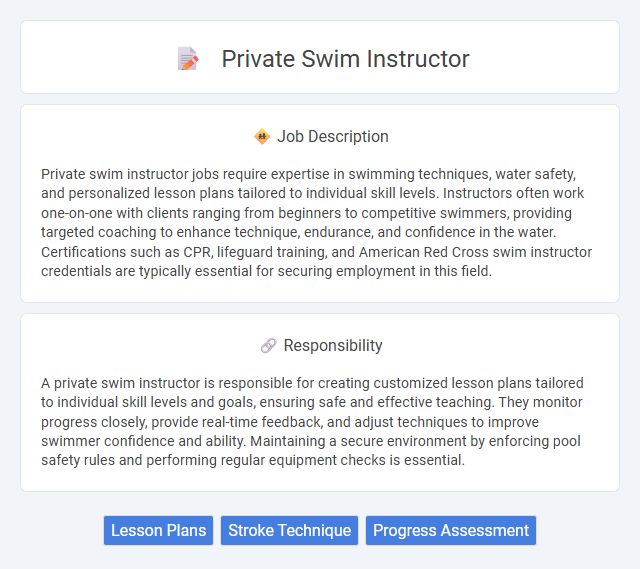
Private swim instructor jobs require expertise in swimming techniques, water safety, and personalized lesson plans tailored to individual skill levels. Instructors often work one-on-one with clients ranging from beginners to competitive swimmers, providing targeted coaching to enhance technique, endurance, and confidence in the water. Certifications such as CPR, lifeguard training, and American Red Cross swim instructor credentials are typically essential for securing employment in this field.
Individuals with strong communication skills and patience are likely suitable for a private swim instructor role, as teaching swimming requires clear guidance and understanding of varied learning paces. Those comfortable working outdoors and adaptable to different weather conditions may find this job favorable. People lacking physical stamina or who have a fear of water might face challenges excelling in this position.
Qualification
A private swim instructor must possess certification from recognized organizations such as the American Red Cross or YMCA to ensure proficiency in teaching water safety and swim techniques. Strong interpersonal skills and experience working with diverse age groups enhance the instructor's ability to tailor lessons to individual needs. CPR and First Aid certification are essential to respond effectively to emergencies during swim sessions.
Responsibility
A private swim instructor is responsible for creating customized lesson plans tailored to individual skill levels and goals, ensuring safe and effective teaching. They monitor progress closely, provide real-time feedback, and adjust techniques to improve swimmer confidence and ability. Maintaining a secure environment by enforcing pool safety rules and performing regular equipment checks is essential.
Benefit
Hiring a private swim instructor likely enhances personalized safety training and skill development, which can significantly boost confidence in the water for all age groups. Personalized lesson plans may increase the probability of faster progress compared to group classes, addressing individual weaknesses and strengths effectively. The flexibility in scheduling often associated with private instruction could provide a convenient solution for busy lifestyles, making consistent practice more achievable.
Challenge
Private swim instructor jobs likely involve the challenge of tailoring lessons to individual skill levels and learning styles, requiring constant adaptability and patience. There is a probability that instructors must manage safety concerns vigilantly while fostering a positive and encouraging environment. The role may demand strong problem-solving skills to address participants' fears or physical limitations effectively.
Career Advancement
A private swim instructor position offers significant opportunities for career advancement through gaining specialized certifications, such as lifeguard training and swim coaching credentials. Experience teaching diverse age groups and skill levels enhances employability and paves the way for roles like swim program coordinator or aquatic facility manager. Networking within swim schools and participating in professional development workshops further accelerate upward mobility in this field.
Key Terms
Lesson Plans
Private swim instructors design tailored lesson plans focused on individual skill levels, goals, and safety protocols to maximize student progress. These plans incorporate stroke techniques, breathing methods, water safety, and endurance training, ensuring comprehensive water competence. Regular assessments within the lesson plans allow for adjustments to meet evolving learning needs and optimize skill development.
Stroke Technique
A private swim instructor specializing in stroke technique provides personalized coaching to improve efficiency, speed, and form in swimming strokes such as freestyle, breaststroke, backstroke, and butterfly. They analyze each swimmer's movement patterns to correct errors, enhance propulsion, and reduce drag, using video feedback and targeted drills. Expertise in biomechanics and aquatic training principles ensures tailored instruction that accelerates skill development and boosts competitive performance.
Progress Assessment
A private swim instructor conducts regular progress assessments to evaluate a swimmer's skill development, stroke technique, and water safety knowledge. These assessments involve tracking milestones such as breath control, endurance, and mastery of various strokes like freestyle, backstroke, and breaststroke. Data from progress evaluations inform customized lesson plans that enhance swimming efficiency and build confidence in the water.
 kuljobs.com
kuljobs.com